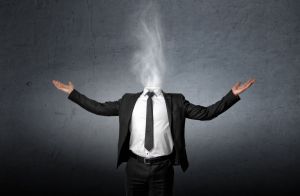|
www.HealthyHearing.com |
Meniere's disease and brain fog: How to copeA wellness mindset will go a long way
Contributed by Glenn Schweitzer When you live with a vestibular (balance) disorder like Meniere's disease, sometimes it’s the lesser symptoms–the ones that are not always addressed directly, like brain fog–that can really make life difficult. 
Even when you aren’t actively experiencing balance problems like vertigo or dizziness, brain fog can still disrupt your ability to be productive. What is brain fog?Simply defined, brain fog is a type of fluctuating cognitive impairment that affects many people suffering from vestibular disorders (and many other health conditions as well). When your vestibular (balance) system is compromised, your brain has to work much harder to maintain equilibrium, and that constant effort takes a toll on cognitive function. The result is a clouding of consciousness and diminishment of mental energy that can impair concentration, executive function, decision making ability, memory and word recall. Many sufferers find it difficult to remember names and specific things they’re supposed to do. 
to remember names and tasks. When my Meniere’s disease symptoms flare up and brain fog rears its ugly head, words get stuck on the tip of my tongue and I find myself forgetting why I walk into rooms. If you’re used to being a productive person, brain fog is a difficult symptom to deal with and can make it hard to stay focused on important tasks. A symptom no one can seeIt’s also an invisible symptom. You don’t look sick, so your friends and family won’t be able to see that you are suffering. It may be difficult for them to fully understand what you’re going through. It’s a big challenge for many vestibular patients. Fortunately, there are coping strategies that can help you better manage brain fog, push through it on difficult days, or even mitigate it altogether. But first, if you suffer from hearing loss (as many Meniere's patients do), keep in mind that you may also experience listening fatigue unless you get treatment, such as hearing aids. Untreated hearing loss will exacerbate your sense of brain fog, and keep in mind that hearing and balance share a common pathway to the brain. Identifying brain fog triggersBrain fog may seem to come and go at random, but it’s often triggered by some external factor in your environment, diet or lifestyle. The problem is that it’s difficult to figure out the specific things that exacerbate your brain fog and other symptoms. The good news is that you can start to identify some of your brain fog triggers by keeping track of various aspects of your lifestyle, diet, environment, and health in a journal. It’s an important step and it can help you to find the patterns and connections that may not obvious in your daily life. Diet? Weather? Stress?Once you’ve kept track for a little while, you can go back and compare the days when your brain fog and other symptoms were at their worst, looking for commonalities and patterns. Maybe you ate too much sodium on all of your worst days, or maybe it was something else in your diet. Maybe you didn’t sleep enough the night before. It could even have to do with changes in the weather. For example, barometric pressure changes can trigger symptoms for some Meniere’s sufferers. You can keep track of everything in an actual journal, but to make this easy for everyone, I created a free downloadable PDF journal template tool called the Meniere’s symptom trigger tool. It was designed for Meniere’s patients, but it can help other vestibular patients to find their triggers as well. This tool enables sufferers to easily track daily symptoms, diet, sleep, supplements and medications, exercise, stress levels, meditation, weather changes (including barometric pressure) and more. Lifestyle management is keyWhen dealing with brain fog, it’s important to build a strong foundation of health through careful lifestyle management. Even if you aren’t actively experiencing debilitating symptoms as a result of your vestibular disorder, ignoring the basics like getting enough sleep, eating well, exercising regularly, and managing stress, can cause brain fog to creep in more and more often. I truly believe this sort of lifestyle management is important for all vestibular patients across the board, but it’s critical when it comes to managing brain fog. Try to improve your health as much as possible–both mentally and physically–so you have the energy necessary to be productive.
When you have a vestibular disorder and you also aren’t sleeping well, exercising regularly, eating healthy foods, or effectively managing stress, most of the limited energy you do have will be utilized elsewhere to deal with the consequences of your unhealthy lifestyle. The healthier you are overall, despite your vestibular symptoms, the better you will be able to manage brain fog. Go for a walk (or exercise)If you are struggling to be productive in the face of brain fog, sometimes the best thing you can do is to stop working and go for a walk. 
back your energy and get fresh air. It’s easy to feel overwhelmed when you have a lot of work to finish but are not mentally feeling up to the task. And often times, trying to push through it can make you feel worse. So the next time you are feeling frustrated by brain fog, try taking a walk. There’s something about walking that both calms and stimulates the mind. I find it works incredibly well to reduce brain fog, enough so that I’m usually able to finish whatever project I’m working on when I return to my desk. Walking is also all you need for your brain to start releasing endorphins, which can reduce stress and make you feel good. If you’ve ever heard someone refer to a “runner’s high,” they’re talking about endorphins. When you are feeling brain fogged, the endorphins released during a long walk might just help you feel a bit better. Better manage priorities with an 80/20 analysisWhen you are experiencing brain fog, it can be helpful to think of the problem as one of limited mental resources. If you understand that you only have a small amount of cognitive energy to complete any number of tasks, you can better manage your priorities. In economics, there is a distribution pattern known as Pareto’s Law. Pareto Vilfredo was an Italian economist in the late 1800’s who discovered a distribution pattern in nature that accurately described many elements of society. His distribution pattern, commonly known as Pareto’s law, states that 20% of any inputs generate 80% of the outputs. Pareto first noticed that 80% of the land in his native Italy was held by 20% of the population. Interestingly, he started finding this distribution everywhere. For example, in his garden, he noticed 20% of the pea plants in his garden produced 80% of the peas. This pattern also directly applies to many aspects of our personal lives and can be leveraged to better manage our priorities. Try to answer the following question: Which 20% of your tasks make up 80% of your priorities? This is where you should focus your energy. And you can take it a step further:
Forced creativityOn my worst brain fog days, it’s hard to feel like doing much of anything, let alone creative work. Most of the time it’s a challenge to do anything other than lay on the couch watching television. But I’ve found that forcing myself to be creative activates my brain in a way that cuts through the fog. It seems counterintuitive, but it can be a powerful way to fight back against brain fog in the midst of a difficult moment. The next time you’re struggling with brain fog, try taking a break from your normal work and force yourself to do something creative for a little while.
Writing works best for me, but the medium doesn’t matter. You can write, paint, draw, take photos, make music, or any other artistic or creative endeavor. If your normal work is creative work, try breaking up your routine by creating something entirely new, or simply work on a different task for a while. This isn’t an easy strategy – it’s difficult to force yourself to be creative on a bad brain fog day – but after 10-20 minutes, you may find yourself in a creative flow that erases the fog. Take lots of notes
to deal with brain fog. One of the best things you can do to cope with brain fog is to take a lot of notes. Remember, with brain fog, your memory is often impaired, so you can avoid a lot of frustration by just writing everything down. I keep stacks of index cards, pads of Post-it notes, and small notepads all over my house. I end up with a lot of loose scraps of paper, but I don’t have to worry about forgetting an idea, appointment, or anything important. You can take notes on your phone too, but I find that actually writing things down on a piece of paper can help you to boost your memory. For random ideas, lists, and general note taking, I use 3” x 5” index cards. This forces me to be concise with my notes, plus it’s easy to carry around. For reminders, I recommend Post-It notes. If there is something I need to remember, I write it down on a note and stick it to the place where I will most likely need to remember it. Another helpful trick is to stick notes to the back of your phone. I do this with important notes that I need to remember at some point in the near future. I also keep a pad of notes next to my bed to write down reminders or anything important that comes to mind as I brush my teeth or fall asleep, and I stick it to the back of my phone to make sure I see it first thing in the morning. Brainwave entrainmentBrainwave entrainment is a powerful audio technology that can completely change your mental state in a matter of minutes, and it’s one of the most effective tools I’ve found for mitigating brain fog. For some vestibular patients, myself included, stimulants like caffeine can trigger symptoms and make brain fog worse. Fortunately, brainwave entrainment can be used to induce a stimulated and focused mental state. This is possible because there is a specific and somewhat predictable brainwave pattern directly associated with every way you could possibly feel. To put it another way: how you feel changes your brainwaves. But incredibly, the opposite is also true. If you can temporarily influence your brainwave pattern to change with an external stimulus, you will experience the corresponding mental state. This effect is known as brainwave entrainment. By simply listening to brainwave entrainment audio embedded with the brainwave frequencies that correlate with being alert and focused, you will experience a boost of mental energy. If you’d like to try it out, I created a pay-what-you-want (READ: free-if-you-want-it-to-be) album of brainwave entrainment audio engineered to help people cope with various symptoms Meniere’s disease like brain fog, fatigue and mental grogginess. Get rid of distractionsThis may seem like a simple solution, but it’s hard to actually implement. Every day we are endlessly bombarded by notifications, content and information. With email, social media, and smartphones, we face more distractions than ever before in human history. When we are already dealing with limited mental resources in the face of brain fog, these seemingly minor distractions can rob us of the little bit of productive energy we have left. Brain fog also requires us to spend more time and energy than is usually necessary to get into the mental space needed to be productive and complete a given task. Every time you get distracted, you have to spend additional energy to re-engage with whatever you’re working on. Before I started writing, I never knew how much time I wasted by being constantly distracted. But every single text message, social media notification, email, and phone call completely destroys my creative flow and it takes a while to get back into the zone, if I do get back at all. Our smartphones are addictive by design. Apps are often engineered to capture our attention as thoroughly as possible. So the next time you struggling with brain fog and need to be productive, simply turn off your phone, or at the very least put it in Do Not Disturb mode. Close your email inbox and web browser, too.
If you want to take it a step further, I recommend keeping an organized workspace as well. A cluttered desk is a distraction in itself and can also be a source of stress. The idea here is to prevent all possible distractions for a period of time so you can get the most out of the limited energy you have to work with. Final thoughtsIf you are actively suffering from brain fog right now, it’s important to understand that the strategies on this list are not meant to be a magic bullet. Often times, a bit of legwork is required to get to a place where you can actually notice improvement. And for many vestibular patients like me, keeping brain fog at bay is an ongoing process that requires careful management and vigilance. But in my opinion, it’s always worth the effort. If you can reduce brain fog even 10 to 20%, it can make a meaningful impact on your quality of life. It means being able to do more of the things you want to do and feeling closer to your old self. Glenn Schweitzer
|
Featured clinics near me
Earzlink Hearing Care - Reynoldsburg
7668 Slate Ridge Blvd
Reynoldsburg, OH 43068

Find a clinic
Need a hearing test but not sure which clinic to choose?
Call 1-877-872-7165 for help setting up a hearing test appointment.


 Glenn Schweitzer is an entrepreneur, blogger, and the author of Rewiring Tinnitus and Mind over Meniere’s. He is passionate about helping others who suffer from tinnitus and vestibular disorders and volunteers as an Ambassador Board Member for the Vestibular Disorders Association (VEDA). Through his blogs, he continues to raise awareness for tinnitus, Meniere’s disease, and other vestibular disorders, spreading his message of hope to those in need.
Glenn Schweitzer is an entrepreneur, blogger, and the author of Rewiring Tinnitus and Mind over Meniere’s. He is passionate about helping others who suffer from tinnitus and vestibular disorders and volunteers as an Ambassador Board Member for the Vestibular Disorders Association (VEDA). Through his blogs, he continues to raise awareness for tinnitus, Meniere’s disease, and other vestibular disorders, spreading his message of hope to those in need.